Bild Places Sign Condemning Anti-Semitism Outside Iran’s Embassy
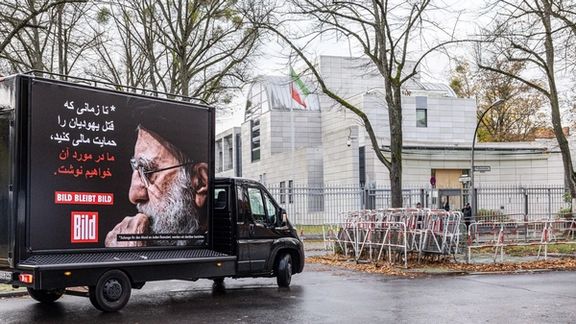
Best-selling German newspaper Bild has placed a large placard in front of Iran's embassy in Berlin as part of a campaign against anti-Semitism.

Best-selling German newspaper Bild has placed a large placard in front of Iran's embassy in Berlin as part of a campaign against anti-Semitism.
The placard, which is mounted on a truck, reads, “As long as you finance the murder of Jews, we will write about it.” The sign also displays an image of Iran’s Supreme Leader Ali Khamenei.
Bild has earlier installed a similar sign with an image of Russian President Vladimir Putin in front of the Russian Embassy.
The Islamic Republic is the main supporter of the Islamist group Hamas, which declared war on Israel on October 7 and killed 1,400 people, mostly civilians, during its multi-thronged attack in Israel. The attack was celebrated by the Islamic Republic, which is considered the main threat to Israel. Regime authorities, including ruler Khamenei, have repeatedly called for the destruction of "the Zionist entity” meaning Israel in the official jargon of the clerical regime.
Last year, German media reported that investigations were underway about the role of nearly a dozen people linked to Iran’s Revolutionary Guards who were accused of launching attacks on Jewish centers.
Earlier in the year, the Berlin Police cancelled for the third consecutive year the "Quds Day" demonstration, an annual anti-Israeli event which takes its name from the Arabic-language name for Jerusalem and is usually held to express support for Palestinians and oppose Israel and Zionism. In Germany there have been repeated discussions about banning rallies to mark the day as anti-Israel and anti-Semitic chants are regularly heard during the events.
Also on Thursday, German Chancellor Olaf Scholz said he was "ashamed and outraged" at a recent wave of anti-Semitic incidents in Germany, warning Berlin would not tolerate such anti-Jewish hatred as he marked the 85th anniversary of the Nazis' “Kristallnacht” pogrom. Scholz was speaking alongside Jewish leaders at a ceremony in a Berlin synagogue, which was attacked with Molotov cocktails in a surge of anti-Semitic incidents that followed the Hamas attack on Israel on October 7 and the subsequent Israeli retaliation.

Iran’s top Sunni cleric Mowlavi Abdolhamid has rejected allegations by regime media as a smear campaign aimed at justifying the crackdown on the Sunni minority.
During his sermon, the outspoken Friday prayer leader of Zahedan, the provincial capital of Sunni-majority Sistan-Baluchestan, rejected reports by Revolutionary Guard-affiliated Fars news agency this week about the Makki Jameh Mosque of Zahedan. The mosque has been the center of anti-regime rallies since the Women, Life, Freedom movement started last year.
Citing an unnamed "informed source,” Fars reported Wednesday that officials at the Makki Mosque had imported 80 mining computers with the help of foreign elements and were involved in cryptocurrency mining. Earlier in the week, the IRGC mouthpiece claimed that security forces have seized "two shipments of 22 communication devices and Starlink satellite internet kits sent by the US National Security Agency for Abdolhamid’s office." Fars said five people were also arrested for facilitating the transfer.
Fars said the shipment of these equipment was aimed at "recreating turmoil in Zahedan," "laying the groundwork for secure communication between domestic agents and foreign entities outside Iran," and "facilitating their propaganda and media activities in the virtual space."
The agency did not provide any evidence to support its claims and no security or intelligence agency has repeated or confirmed such allegations.
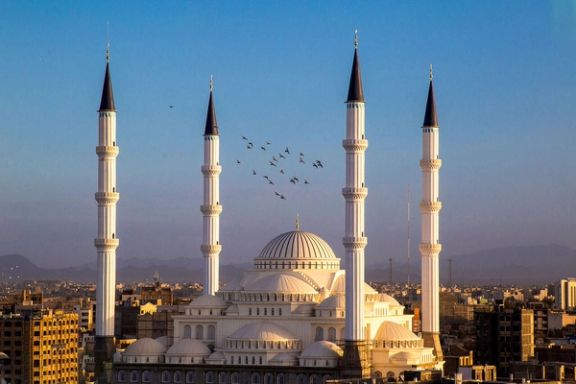
Addressing the false accusations, Abdolhamid stated that media outlets "close to the government and influential bodies" should reconsider their loyalty to the truth instead of “blatantly engaging in lying and making accusations against critics, opponents, advocates of justice, and proponents of legitimate freedoms.”
"Media outlets like Fars News Agency have resorted to baseless accusations and falsehoods against critics. Such disinformation aims more to sideline critics and disturb public opinion. This is not the solution; the solution lies in listening to people's opinions and criticisms."
Abdolhamid added, "It is in the best interest of the nation that newspapers and media outlets remain free. Media is meant to reflect reality,” criticizing the authorities that summon or threaten the public, media owners, and journalists for even slight criticism.
Since the war broke out in Gaza after Hamas' terror attack on Israel on October 7, Abdolhamid has repeatedly rejected the regime’s calls for the destruction of Israel, saying that neither side should be destroyed.
The Sunni cleric has been a voice of moderation and justice since September 2022, when the death in custody of Mahsa Amini sparked the boldest uprising against the Islamic Republic regime. He is a vocal critic of Supreme Leader Ali Khamenei and his absolute authority. Earlier this year, the hacktivist group Black Reward targeted the data servers of Fars news agency, and released several documents to media indicating that Khamenei is dismayed by Abdolhamid’s fiery remarks and ordered underlings to tarnish his reputation. Iran’s Sunni minority is heavily persecuted, and the cleric has long been an advocate of minority rights, to the ire of the regime, as nearly 15 million Sunnis – mainly Baluch and Kurds -- listen to him.
Human rights media outlet Haalvsh, a website dedicated to human rights and events in Sistan-Baluchestan, has reported the presence of military forces and intense security measures around the Makki Mosque since Friday morning.
Regime agents and blocked the roads and streets leading to the mosque, set up checkpoints, and conducted physical inspections of passersby and people who wanted to attend the Friday prayers.
Like every week for over the past year, the citizens held a peaceful demonstration after they left the mosque. The people of the Sistan-Baluchestan, with Zahedan as provincial capital, have been holding weekly protests after security forces opened fire at peaceful protesters, killing nearly 100 on September 30, 2022, a day known as the Bloody Friday of Zahedan.
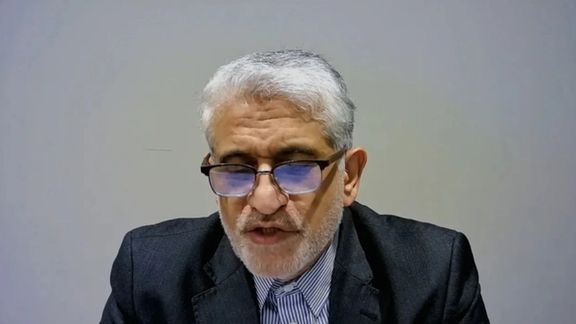
Iran continues to send mixed messages on the Hamas-Israel war, saying to the United Nations that it does not seek to escalate the war, but it inevitably will.
Amir Saeid Iravani, Iran's ambassador to the United Nations, told CNN Thursday that his government has “insisted that we are not going to expand this war front.”
He also claimed Tehran has nothing to do with attacks against US forces mushrooming across the region since Hamas declared war on Israel. “We have said very clearly that Iran is not involving in any attack against the United States forces in the region.”
Earlier in the day, Iran’s Foreign Minister Hossein Amir-Abdollahian said the continuation of Israel’s retaliatory offensive against Hamas would inevitably lead to an expansion of the conflict.
Such conflicting statements by the Iranian regime have been recurring since October 7, when the Tehran-backed Islamist militants killed 1,400 people, mostly civilians in Israel and ignited the current crisis. Israel has been pounding the enclave to uproot the Islamist group, which has made the war exceedingly bloody hiding deep among the civilian population and underneath the coastal sliver’s non-military facilities.
Iran supports Hamas but says it did not play any role in the October 7 attack. Iran also backs the Hezbollah, a Lebanese militant group that has deep ties with Hamas and Islamic Jihad, another Palestinian faction in Gaza that is also backed by Iran.
Iran provides support to militant groups, giving arms and training in overt and covert ways.
Pentagon deputy press secretary Sabrina Singh said on Thursday that the US forces have been attacked 46 times since October 17. That includes 24 attacks in Iraq and 22 in Syria, she added. A total of 56 troops have been injured in the attacks, the Pentagon says.
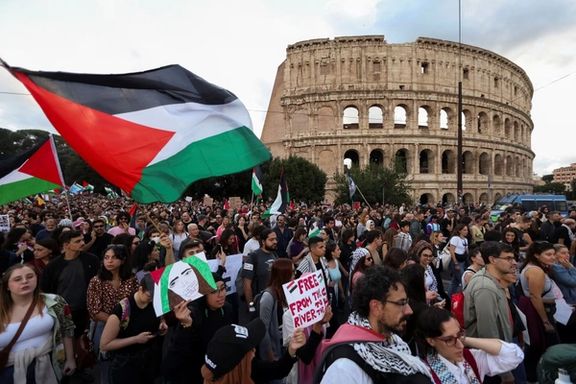
A senior official in Iran has said that Supreme Leader Ali Khamenei and Hezbollah leader Hassan Nasrallah have launched a “war of attrition” to destroy Western civilization.
Alireza Panahian, a cleric and senior official in Khamenei’s office, was quoted by local media as saying during a television program that “With Israel’s destruction, Zionism will not disappear. Currently, Hassan Nasrallah and our leader are waging a war of attrition to uproot it. Western civilization will be destroyed by a war of attrition in this region.”
Panahian is known as a speaker for Khamenei’s office, and he would hardly make such statements without coordination with the Supreme Leader’s inner circle. Usually, Iranian politicians, commentators and media take Panahian’s statements as indication of what Khamenei wants to convey to the public.
Since the October 7 brutal Hamas attack against Israeli border towns, the Jewish state has reacted with overwhelming force, first bombing hundreds of targets in Gaza and then starting a ground invasion of the northern part of the enclave. Israel has declared that the aim of the operation is to eradicate Hamas. Some commentators have argued that Iran did not expect such a strong reaction and overwhelming Western support for Israel.
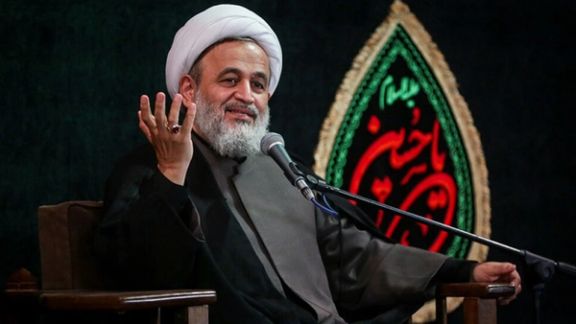
The Islamic Republic has been backing Hamas and other Islamist Palestinian groups financially and militarily for the past two decades. Hamas officials have thanks the Iranian regime for its support. It is generally believed that militant Palestinian group would not have launched its terror attack on Israel on October 7 without the knowledge and approval of the Iranian regime.
In addition, the Iranian government celebrated the attack that killed more than 1,000 civilians in Israel and kidnapped more than 200 others. Tehran’s actions and contradictory statements since then have provided more signs of its strong support for Hamas’ actions.
Panahian added that the Western strategy is based on quick victories, but a long war is not part of their culture. He emphasized that followers of Shiite Iran will be the victors of a long conflict.
Asked if he supports a ceasefire, Panahian said, “Yes, a ceasefire in these conditions without the victory of the Zionists is detrimental to them. However, the point is that Hamas, Hezbollah in Lebanon, Yemen, and the resistance do not unveil all their capabilities. This means that a ceasefire poses a significant threat hanging over their heads."
This remark would reinforce the arguments of those who are against a ceasefire at this point, which they say would enable Hamas to survive, regroup and continue terror attacks.
Panahian’s theory of Iran waging a war of attrition is partly based on the calculation that eventually countries will put enough pressure on Israel to agree to a ceasefire before a decisive Hamas defeat.
However, it could also be public posturing to demonstrate that Tehran did not miscalculate in allowing or planning the October 7 attack, since it has decided to mostly watch Hamas’ possible destruction from the sidelines. After all, the Iranian regime has an audience of hardliners at home and allies and proxies in the region and cannot afford to look weak and confused.
Walter Russel Mead argued in an opinion piece in The Wall Street Journal that Iran’s real goal of allowing the Hamas operation was to disrupt Saudi Israeli normalization talks.
“But so far, from a global perspective, the most important fact is that Iran isn’t getting what it wanted from the war. Iran’s objective in arming, training and encouraging Hamas wasn’t solely to cause Israel pain. The real goal was to disrupt the gradual deepening of the strategic ties between Israel and its most important Arab neighbors,” Mead maintained.
He highlighted that countries like Egypt, Saudi Arabia and the United Arab Emirates “have all signaled that they intend, once the storm has passed, to go on working with Jerusalem for a safer, more stable Middle East. Worse from Iran’s point of view, the Arabs are committing to a revived form of Palestinian governance that can exclude Iran’s proxies from both the West Bank and Gaza.”
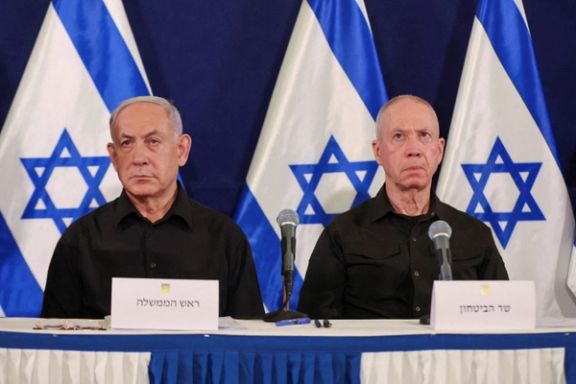
Israel says the war will continue until the eradication of Hamas, underlining that the future of the region and the world depends on the outcome of the conflict.
Israeli Prime Minister Benjamin Netanyahu, in an exclusive interview with Fox News on Thursday, declared that this is a war between “the entire civilized world and barbarism,” noting that a victory by Iran’s axis of terror -- including Hamas, Hezbollah, and Houthis-- will plunge the region and the world into a dark era.
Admitting that Israel’s retaliatory offensive into Gaza is “taking a little longer than” he had hoped, he highlighted that Israel would not agree to a ceasefire because “our future, the future of our neighbors, the future of Palestinians and the future of the world is related to who wins.”
“Does the axis of terror of Iran, Hezbollah, and Houthis win? Or do the forces of progress and prosperity – Israel, the US, the modern Arab states win?” he said, adding that if “the bad guys” win, “they can cast the Middle East and the entire world into another period of dark ages.”
"A cease-fire with Hamas means surrender to Hamas, surrender to terror and the victory of the Iran's axis of terror, so there won't be a cease-fire without the release of Israeli hostages," he insisted.
"We don't seek to conquer Gaza, we don't seek to occupy Gaza, and we don't seek to govern Gaza," Netanyahu said, adding that “we have to have a credible force that, if necessary, will enter Gaza and kill the killers. Because that's what will prevent the reemergence of a Hamas-like entity.”
Washington has said it would oppose Israeli post-war occupation of Gaza, where Israel has waged a bombing campaign to destroy the enclave's Hamas rulers after militants rampaged through southern Israeli communities on October 7 in an attack that Israel says killed 1,400 mostly civilians.

Undeterred Iran proxies have launched four attacks on American troops the day after US fighter jets struck an IRGC arms depot in Syria.
A Pentagon spokesperson confirmed that three personnel were lightly injured in the attacks, bringing the number of US military injuries to almost 60 in a total of 46 drone and rocket attacks since October 17.
The US airstrike in Syria early hours of Thursday was meant to be a warning shot. US Secretary of Defense Lloyd Austin said in his statement following the operation, “we urge against any escalation."
Iran and its proxies seem to have ignored the message.
Iran’s foreign minister told his Qatari counterpart that “with the intensification of the war on civilians in Gaza, expansion of the scope of the war has now become inevitable.”
Israel's military said a group in Syria launched a drone that hit a school in the southern Israeli city of Eilat on Thursday and that it struck the group in response.
The Israeli military did not say what organization in Syria had launched the drone toward Eilat, on the Red Sea approximately 400 kms (250 miles) from the nearest point in Syrian territory.
But it said in a statement it holds Syria's government fully responsible "for any terror activity emanating from its territory." There were no reports of injuries from the drone strike, which caused light damage.
Iraqi militias have explicitly stated that they will carry on attacking American targets while the US government lends its unconditional support to Israel’s onslaught on Gaza.
And Houthis in Yemen continue to launch missiles at Israel.
US officials say they hold the regime in Iran to be ultimately responsible for all such attacks. But many in Washington seem to believe that the administration’s response is too little, if not too late.
“The Biden administration sends a message of weakness when it refuses to enforce the oil sanctions on Iran,” said Senator John Kennedy to Fox News Thursday. “[They] think if we're just nice guys, that we can be partners with Iran. And we can't.”
Biden’s Iran policy came under attack in the Republican presidential debate Thursday night. All candidates called for tougher actions. Senator Tim Scott was perhaps the one with the harshest comment.
“If you want to make a difference,” he said, “you cannot continue to have strikes in Syria on warehouses, you have to cut off the head of the snake. And the head of the snake is Iran."
Former president Trump, who is running for President again, also weighed in on the subject in an interview Thursday night –blaming it all on the Biden administration.
“This [war] is something that would have never happened with me,” he claimed. “We were actually getting along well with Iran. We would have had a deal with Iran; and they didn’t have the funds to do what they’re doing now… they were broke. There were a lot of problems with Hezbollah… they were all complaining that they’re not getting any money. That was a good thing."
Iranian officials have been warning of a full-scale regional war ever since Israel attacked Gaza in response to Hamas’ unprecedented operation inside Israel that killed 1400.
Yemen's Iran-aligned Houthi movement has also launched repeated missile and drone attacks on Israel since October 7, all of which were either shot down or fell short.
On Thursday, the Houthis, which govern swathes of Yemen including the capital Sanaa, said they fired ballistic missiles at various Israeli targets including what the group's military spokesperson described as military targets in Eilat.
Israel's military said its "Arrow" air defense system intercepted a missile launched at Israeli territory near the Red Sea, and that its Patriot defense system had intercepted a "suspicious target" in the southern Negev desert.